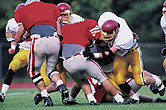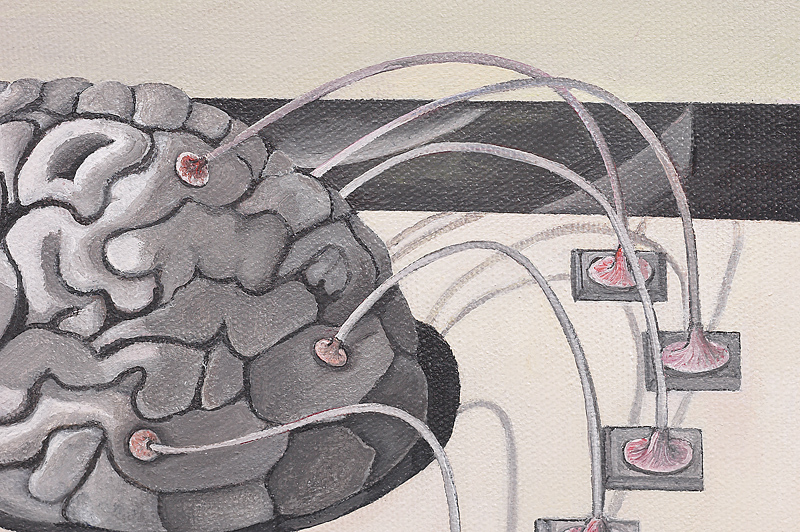
TUESDAY, May 13, 2014 (HealthDay News) — An area of the brain related to memory and emotion may be smaller in college football players than it is in their non-playing peers — especially those players with a history of concussion, a small study suggests.
Experts said the real-life significance of the brain difference is not yet clear. But the study, reported in the May 14 issue of the Journal of the American Medical Association, offers some of the first evidence of longer-term brain effects seen in young football players.
It’s well known that young athletes can have problems with memory and other mental tasks after a concussion. But when it comes to lasting effects on the brain, studies have focused on professional athletes — often years after their careers have ended, explained senior researcher Patrick Bellgowan, an associate professor at the Laureate Institute for Brain Research in Tulsa, Okla.
For the study, Bellgowan and his colleagues analyzed MRI brain scans from 50 college football players — half of whom had a history of concussion — and 25 non-players of the same age and education level.
The researchers focused on the hippocampus, an area of the brain that helps store memories and regulate emotions. On average, they found, both groups of football players had a smaller hippocampus than non-players, but the difference was most pronounced among players with a history of concussion.
Compared with non-players, their hippocampus was about one-quarter smaller, on average.
“This shows you can start to see changes in hippocampal volume even in young players, about 20 years old,” said Bellgowan.
The big question, though, is what does it mean? Bellgowan’s team gave the athletes standard tests of memory and reaction time, and found no correlation between athletes’ hippocampal volume and their test performance.
“We didn’t see effects,” Bellgowan said. “It’s possible that structural changes in the brain come first, and cognitive effects come later. But we don’t know.”
A concussion expert who reviewed the study said the findings are important but agreed that, for now, the real-world implications are unclear.
“What is the functional outcome of this? We just don’t know,” said Kenneth Podell, co-director of the Houston Methodist Concussion Center in Texas.
It’s known that in older adults, the hippocampus often “shrinks” before dementia symptoms set in, Podell noted.
And, Bellgowan said, the hippocampus is one of the brain areas affected in chronic traumatic encephalopathy (CTE), a progressive decline in brain cell function that eventually causes problems with memory, movement and balance. And it’s been found in professional athletes in contact sports who have a history of repeat concussions.
Still, more work is needed to know whether the smaller hippocampus in college football players is truly due to the sport itself, according to Podell.
The findings do raise the possibility that even “subclinical” knocks to the head have effects, he noted. Players without a concussion history also had a smaller hippocampal volume than non-players, and players who’d been in the sport for a longer time tended to have a smaller hippocampus than their peers with shorter careers.
“Could that be related to repeated hits to the helmet over the course of a season?” Podell said. “We don’t know.”
Complicating matters, many factors can affect hippocampal size. Genetics, hormones and general intelligence are among them. And, Podell said, “Stress is the number one factor in hippocampal atrophy [shrinkage].”
Bellgowan agreed that college football players are under physical and psychological stress, and that could be a factor in their hippocampal size.
He and Podell both said longer-term studies are needed to follow changes in brain volume among young football players over time. But it could prove difficult to pinpoint any effects on memory or other mental functions.
“The problem is, you may not see the results for decades,” Podell said.
For now, the results underscore the importance of taking young athletes’ concussions seriously, Bellgowan said. That means players, coaches and parents should know the signs and symptoms of concussion — including headache, confusion, dizziness, balance problems, sensitivity to light or noise, and difficulty concentrating.
Experts stress that athletes with any signs of a concussion should be taken out of the game, and not return to play until a health professional gives them approval. In fact, all 50 states and the District of Columbia now have some kind of law on youth concussions that protects athletes from returning to play too soon.
More information
The U.S. Centers for Disease Control and Prevention has more on concussion in sports.
Copyright © 2026 HealthDay. All rights reserved.

